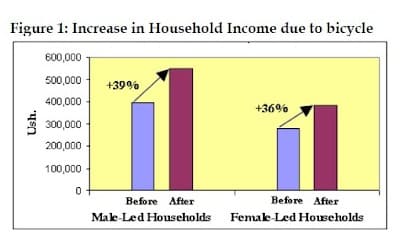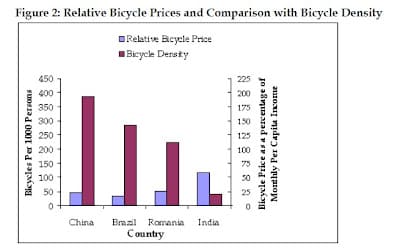In recent times, the Indian government’s increased attention has spurred progress in the agricultural sector. When assessing transportation in terms of its cost-effectiveness in alleviating rural poverty, it appears highly advantageous. Notably, investments in roads during the 1990s surpassed other rural economic initiatives, yielding returns 3-10 times greater.
Road investments, which improve transportation, are closely linked to the crucial role of owning bicycles in rural transportation. Bicycles support the broader impact of roads on local communities.
BicyclePotential.org delves into the concept of bicycles as prime instruments in combating rural poverty in India. By scrutinizing studies and trials, it unveils the bicycle’s often-overlooked capacity for rural development and poverty diminution, considering that:
- India’s per capita bicycle ownership (1/7) pales in comparison with other developing countries like China and Brazil.
- The cost of bicycles, relative to average income, is twice as high in India as in these nations.
- Experiments in African nations (Uganda and Tanzania) and Sri Lanka with numerous households demonstrated that bicycles could augment a family’s income by up to 35%.
 Transportation emerges as the second most potent force in eradicating rural poverty in India over the past four decades. Elevating bicycle density to standard levels could significantly boost rural growth. The primary deterrent for low bicycle density in India is its prohibitive cost relative to family incomes, especially when contrasted with other nations. (Please click the figure below for an enhanced view).
Transportation emerges as the second most potent force in eradicating rural poverty in India over the past four decades. Elevating bicycle density to standard levels could significantly boost rural growth. The primary deterrent for low bicycle density in India is its prohibitive cost relative to family incomes, especially when contrasted with other nations. (Please click the figure below for an enhanced view).
 Halving bicycle prices through subsidies could dramatically escalate ownership in India, leading to marked productivity gains. Such subsidies, precisely aimed at the most impoverished, promise leak-proof benefits with enduring impacts. Over time, this could enhance the productivity of approximately 200 million impoverished individuals.
Halving bicycle prices through subsidies could dramatically escalate ownership in India, leading to marked productivity gains. Such subsidies, precisely aimed at the most impoverished, promise leak-proof benefits with enduring impacts. Over time, this could enhance the productivity of approximately 200 million impoverished individuals.
- This subsidy would represent a mere 1-2% of the total Central Government subsidy expenditure.
- Ironically, while substantial subsidies are allocated for petrol, predominantly benefiting middle-class households, the bicycle, a staple for poorer families, receives little support.
- Despite the presence of rural roads, inadequate bicycle density remains a critical hindrance to rural transport.
The humble bicycle holds an unheralded promise for rural India.
Below are some famous economists and public policy thinkers’ opinions on the concept.
I read your email note on importance of bicycle for rural productivity and growth. I am in agreement with your thrust. I congratulate you on this line of thinking.
Dr. S. C. Jha, Member, Economic Advisory Council to the Prime Minister.
Nice idea….. I’ll read the whole report.
Mr. S. M. Krishna, Foriegn Minister, India and Former Chief Minister, Karnataka.
Many thanks for your email and the report on the need for increase in bicycle density in rural India to alleviate poverty. I shall definitely tell this to my colleagues and discuss with them your report.
Dr. Pinaki Chakraborty, Senior Fellow, National Institute of Public Finance and Policy (NIPFP)
As an idea to combat rural poverty this could be one of the weapons…..the hinterland still stays same, without road, without electricity, without communication. Your pet bicycle will play wonders there.
Dr. P. R. Jena, Senior Economist, National Institute of Public Finance and Policy (NIPFP)
Gaurav, Great idea!
Mr. Gurcharan Das, Noted Columnist and Chairman, Center for Civil Societyy
I have shipped over one hundred and twenty two thousand bicycles to thirty developing world countries. I have seen first hand the dramatic impact. IF you can get twenty percent of the working age walking adults on to a bicycle there is a cumulative effect which exponentially lifts the Commerce ( economy) of a town.
David Schweidenback, President, Pedals for Progress, An American NGO involved in providing used donated bicycles to developing countries.